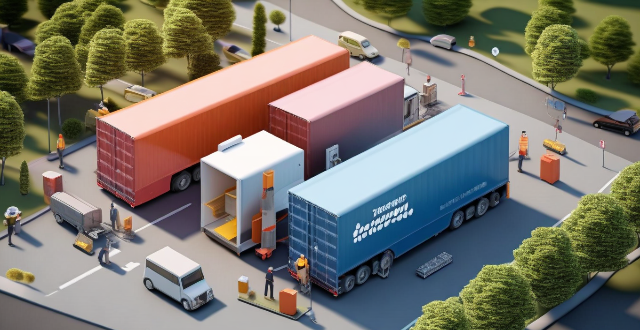Blockchain technology can improve supply chain management in transportation by providing enhanced transparency, increased efficiency, improved security, and greater collaboration. This can lead to reduced costs, faster dispute resolution, and improved customer satisfaction. Blockchain allows for real-time tracking of goods, shared data access, automated processes, and reduced paperwork. It also ensures data integrity, builds trust among parties, and helps mitigate risks. By encouraging collaboration and open standards, blockchain promotes innovative solutions that can further improve supply chain management in transportation.

How Blockchain Technology Can Improve Supply Chain Management in Transportation
Blockchain technology has the potential to revolutionize supply chain management in transportation by providing a secure, decentralized, and transparent system for tracking goods and transactions. This can lead to increased efficiency, reduced costs, and improved customer satisfaction. Here are some ways blockchain technology can improve supply chain management in transportation:
Enhanced Transparency and Visibility
- Real-time tracking: Blockchain allows for real-time tracking of goods throughout the supply chain, providing stakeholders with up-to-date information on the location and status of their shipments.
- Shared data: All parties involved in the supply chain can access a shared database that contains accurate and consistent information about each product, from its origin to its final destination.
- Audit trail: The immutable nature of blockchain ensures that all transactions are recorded in a tamper-proof manner, creating an audit trail that can be used for compliance and regulatory purposes.
Increased Efficiency and Cost Reduction
- Automated processes: Smart contracts can automate many manual processes involved in supply chain management, such as order processing, payment settlements, and customs clearance.
- Reduced paperwork: By digitizing documents and processes, blockchain can significantly reduce the amount of paperwork required in supply chain management.
- Faster dispute resolution: In case of any disputes or discrepancies, blockchain's immutable record can help resolve issues quickly and efficiently, reducing downtime and associated costs.
Improved Security and Trust
- Data integrity: Blockchain's cryptographic algorithms ensure that data stored on the network is secure and cannot be altered without detection.
- Trust building: The transparency and security provided by blockchain help build trust among all parties involved in the supply chain.
- Risk mitigation: By identifying potential risks early on and taking corrective actions, blockchain can help mitigate risks associated with supply chain disruptions, fraud, and counterfeit products.
Greater Collaboration and Innovation
- Collaborative ecosystem: Blockchain encourages collaboration among different organizations within the supply chain, leading to better coordination and innovation.
- Open standards: The use of open standards in blockchain technology promotes interoperability between different systems and applications, allowing for greater flexibility and scalability.
- Innovative solutions: As more companies adopt blockchain technology for supply chain management, new innovative solutions will emerge, further improving efficiency and effectiveness.
In conclusion, blockchain technology has the potential to transform supply chain management in transportation by providing enhanced transparency, increased efficiency, improved security, and greater collaboration. By leveraging these benefits, businesses can streamline their operations, reduce costs, and deliver superior value to their customers.